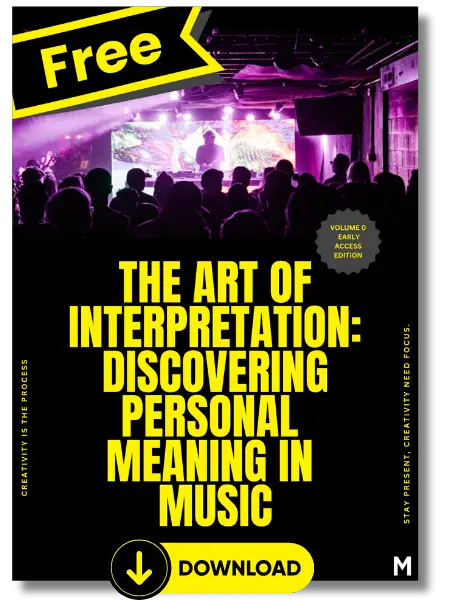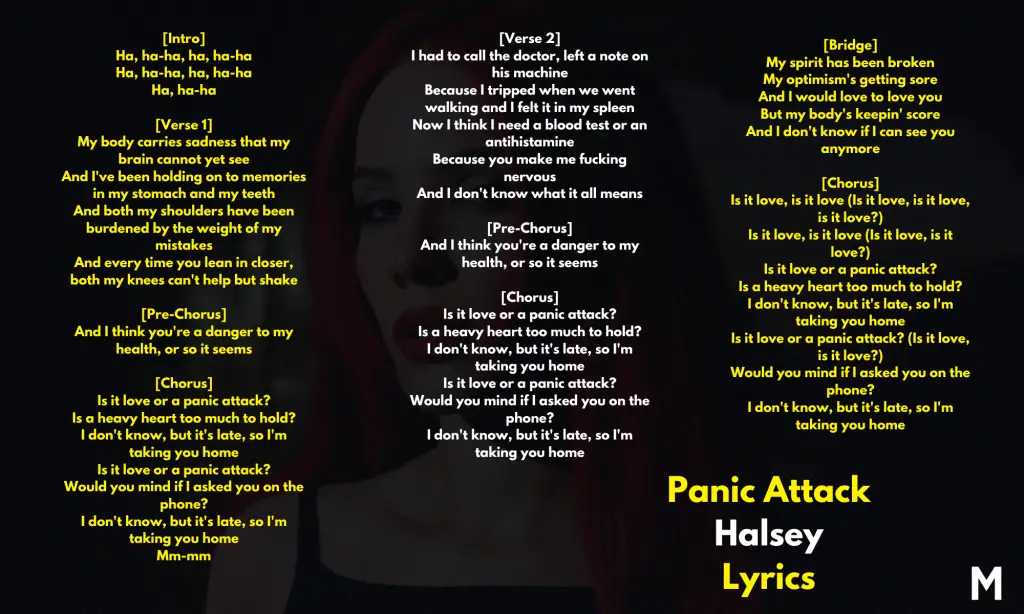Table of Contents
Image C/O Columbia Records
With “Panic Attack,” Halsey digs deep into the tricky space between love and fear, and I think that’s where the song’s real impact lies. These lyrics hit on something a lot of us feel: that overlap between strong attraction and the raw vulnerability that can follow us around.
With my background in English Lit and creative writing, I will analyze these lyrics in a way that brings in a few classic poets to help explain the emotions going on here. Now, this is just my take, but sometimes reading modern lyrics alongside timeless poetry can bring out new angles that make you look at the song differently.
This song also gives us a good reason to dive into those literary comparisons and see what poets like Sylvia Plath, Anne Sexton, and Rainer Maria Rilke can add. These poets wrestled with the same idea Halsey’s tackling: how emotions like love and anxiety don’t just sit in our minds—they settle in the body, too.
Each of these writers has a unique way of showing how emotional experiences can turn into a physical “weight” we carry around. So let’s jump in, bring in a bit of poetry, and see what kind of timeless meaning we can uncover in Halsey’s lyrics.

Why Not Find Meaning In Music Unique To You?
If you’re interested in exploring song lyrics on an even deeper level, you might enjoy my free eBook, The Art of Interpretation: Discovering Personal Meaning in Music. In it, I break down practical techniques for interpreting lyrics and connecting them to personal meanings, themes, and emotions.
Whether you’re reading Halsey’s lyrics or diving into classic poetry, this guide helps you develop the skills to find new perspectives and connect with lyrics on your own terms. As we’ve done in this article, you’ll learn how to draw from literary history and your own experiences to reveal layers of meaning in your favorite songs.
In The Art of Interpretation, I’ll guide you through the same kinds of insights we’re exploring here, so you can uncover interpretations as unique as your own voice.
Plus, it’s completely free, making it easy to dive into these methods and enrich your experience with music. This eBook is for anyone who wants to see their favorite songs through a new lens and make deeper, more personal connections with the music they love. Download it today and take your interpretation skills to the next level!
See Halsey Live On Tour Here👈
[embed]https://youtube.com/watch?v=8hE89IogcmM&si=eaSzxLNtPWO-lfMG[/embed]Halsey Panic Attack Lyrics

Halsey Panic Attack Meaning
“My body carries sadness that my brain cannot yet see”
This opening line is a powerful way to start the song. Right away, the singer talks about feeling sadness in their body before their mind can understand it. This is a big deal because it shows that the person is feeling emotions in a physical way. It’s almost like the body is telling them something before they can even think it through. This reminds me a lot of Sylvia Plath’s poem Elm.
In that poem, she writes, “I know the bottom, she says. I know it with my great tap root: it is what you fear.” Plath is using the image of a tree to show how trauma can get stuck deep inside a person, just like how the singer feels sadness in their body. Both Plath and the singer are saying that feelings can get stuck deep inside us, and we might not even know how bad it is until later.
“And both my shoulders have been burdened by the weight of my mistakes”
This line talks about how the singer feels the weight of their mistakes in their body—on their shoulders, to be exact. It’s another example of how they are holding on to things physically. This is important because it shows that emotional pain doesn’t just stay in the mind; it affects the whole body. Anne Sexton’s poem The Truth the Dead Know talks about this idea too.
In that poem, Sexton writes, “the purest silence they bring is death.” What she means here is that grief and sadness can make you feel numb, almost like you’re carrying a heavy silence or burden. Both the singer and Sexton are showing how emotional pain can weigh you down, making it hard to move forward.
“Is it love or a panic attack?”
This is the big question in the song, and it’s repeated in the chorus over and over. The singer can’t tell if what they’re feeling is love or just fear. It’s confusing because both love and anxiety can make your heart race and your body react in strong ways. This reminds me of Rainer Maria Rilke’s poem The Panther.
In that poem, Rilke writes, “His vision, from the constantly passing bars, has grown so weary that it cannot hold anything else.”
Rilke’s panther is stuck in a cage, and it can’t even see beyond the bars anymore. It’s a lot like how the singer feels trapped between love and fear, not sure what’s real because of their own emotional “cage.” They’re stuck, just like the panther, unsure if they should move forward or stay back.
“You make me fucking nervous, and I don’t know what it all means”
This line really gets to the heart of the problem. The singer feels so nervous around the other person that they don’t know if it’s a good thing or a bad thing. It’s like their body is sending them mixed signals, and they can’t figure out if it’s because of love or anxiety. This ties back to The Panther by Rilke, where the panther’s pacing in the cage shows its nervous energy. It’s just walking back and forth, feeling restless but not able to do anything about it.
In the same way, the singer feels nervous but doesn’t know what it means. They feel trapped by their own emotions.
“My body’s keepin’ score”
This line in the bridge of the song is really important. It means that the singer’s body is still feeling all the hurt and pain from the past. Even though they want to move on and maybe even love the other person, their body is telling them something different.
This reminds me a lot of Anne Sexton again. In The Truth the Dead Know, she writes, “I am tired of being brave.” Sexton is saying that it’s hard to keep going when you’ve been hurt over and over.
Both the singer and Sexton are showing that sometimes, no matter how much you want to be strong or move on, your body won’t let you. Your body remembers the pain, and it makes it hard to open up to love again.
Themes, Meanings, and Poetic Throughlines

At its core, “Panic Attack” wrestles with the struggle of feeling pulled between love and fear, making the lyrics relatable and grounding them in powerful, emotional truths. The song’s main question—“Is it love or a panic attack?”—reflects a universal human conflict, where the intensity of new emotions often blurs into past hurts and insecurities. This echoes Sylvia Plath’s Elm, where she writes, “I know the bottom, she says. I know it with my great tap root: it is what you fear.”
Both the song and Plath’s poem convey that past trauma can take root deep within us, making it hard to differentiate genuine affection from the memories of old wounds. This theme of emotions that feel physically rooted in the body is present throughout Halsey’s lyrics, tying back to Plath’s poetic exploration of how deeply ingrained our fears can be.
Anne Sexton’s The Truth the Dead Know also speaks to this feeling of being haunted by past experiences, specifically in the way grief can overwhelm the mind and body. Sexton’s line, “I am tired of being brave,” expresses a weariness in facing heavy emotions head-on, a theme that Halsey’s lyrics reflect in lines like, “My body carries sadness that my brain cannot yet see.”
Both Sexton and Halsey show that sometimes the body is forced to bear the weight of unresolved emotions. In Panic Attack, this weight even manifests physically, as the singer describes their sadness held in their “stomach” and “teeth,” images that imply these feelings are nearly impossible to release. The idea that past emotional pain is kept alive within us—affecting present relationships—is central to both Halsey’s song and Sexton’s work.
Lastly, Rainer Maria Rilke’s The Panther mirrors Halsey’s feeling of being trapped by the physical symptoms of anxiety, especially in relationships. Rilke’s panther, pacing endlessly in its cage, symbolizes a mind confined by repetitive, unresolved emotions, much like Halsey’s depiction of being stuck between love and panic.
Rilke describes the panther’s “weary vision” as unable to hold “anything else,” capturing the effect of mental agitation on the mind’s clarity. This mirrors Halsey’s lyrics about feeling “fucking nervous” without understanding what it all means. Both the song and Rilke’s poem convey the emotional toll of feeling trapped in patterns of anxiety and longing, pointing to the main takeaway: true love and inner peace can feel out of reach until past pains are acknowledged and worked through. In the end, Panic Attack gives voice to the struggle of distinguishing between genuine connection and the shadows cast by past emotional scars.
The post Halsey Panic Attack Lyrics And Meaning: The Body Keeps Score—Poetic Parallels Explained appeared first on Magnetic Magazine.